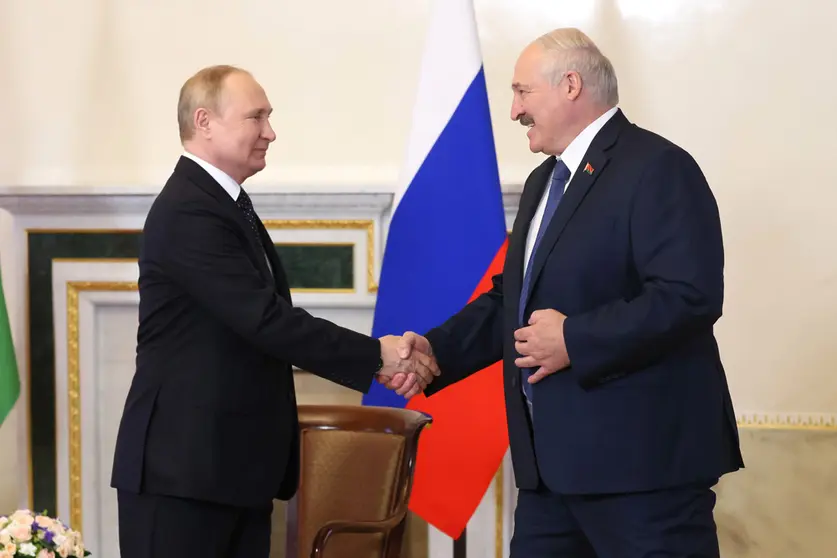Russia intends to supply nuclear-capable Iskander-M missile systems to Belarus in the coming months, President Vladimir Putin said on Saturday, as his forces solidified their battlefield gains in the eastern city of Severodonetsk.
Putin made the remarks at a meeting with Belarusian strongman Alexander Lukashenko in St Petersburg, the Russian state news agency TASS reported.
Putin said the Iskander systems could "accommodate both ballistic missiles and cruise missiles - both conventional and nuclear."
They have a range of up to 500 kilometres, according to Russian media.
Details and logistics of the weapons transfer would be discussed by the defence ministers of the two countries, Putin said.
The Russian leader also said that Russia would help Belarus upgrade its fleet of Su-25 fighter jets.
Belarus has been a key player in the Russian military campaign against Ukraine. The country served as a staging ground for Russian troops to invade on February 24.
Missiles fired
Ukraine said on Saturday that Russian troops had fired dozens of missiles at the Ukrainian cities of Zhytomyr and Chernihiv from Belarus.
In Severodonetsk, the eastern city that has been reduced to rubble after weeks of gruelling street fighting and aerial bombardments, both sides said Russia was now in full control.
"After the withdrawal of units of our troops, the enemy has taken hold in Severodonetsk," the military's general staff said in Kiev on Saturday evening, adding that Russia has also expanded control over more suburban areas and outlying villages.
On Friday, Ukrainian troops defending Severodonetsk were ordered by Kiev to retreat.
Severodonetsk Mayor Oleksandr Striuk said the occupiers had begun imposing Russian rule and had appointed a commander, according to the Kiev-based news agency UNIAN.
It was unclear where Striuk was speaking from.
Striuk also said there were still civilians sheltering at the Azot chemical plant, which was the last stand of Ukrainian resistance in Severodonetsk before the city fell to Russian forces, though he did not say how many.
According to the Russian state agency RIA Novosti, the Azot site is now under the control of Russian troops and separatist fighters.
Civilians
The pro-Russian separatists said that more than 800 civilians had left the plant since they took charge, the Russian news agency Interfax reported on Saturday.
Severodonetsk had a pre-war population of about 100,000. The mayor said several thousand civilians remain in the city.
With the capture of Severodonetsk, Russia and its allied separatist forces are now in a position to seize control of the entire Luhansk region, which, with neighbouring Donetsk, forms the Donbass, the predominantly Russian-speaking area of eastern Ukraine, control of which Moscow sees as a key goal.
Ukrainian President Volodymyr Zelensky restated his determination in his Saturday evening video address to take back all Ukrainian cities captured by Russia, mentioning Severodonetsk by name, alongside Donetsk, Luhansk, Melitopol and Mariupol.
"All other Ukrainian cities that are temporarily under occupation will be Ukrainian again," Zelensky promised, though he also conceded that Ukraine had been hit by some 45 Russian missiles in the course of the day, and stressed that his country needed more military help.
Ukraine was in a morally and emotionally difficult phase of the war, he said. "We understand that we can still protect the state," Zelensky said, adding that he would not know how great the losses and sacrifices would be until victory was on the horizon.
Elsewhere in Ukraine, the Neutron Source nuclear research facility in the country's second city of Kharkiv once again came under Russian fire, Ukraine's nuclear regulatory authority said.
Buildings and infrastructure including ventilation ducts were said to be damaged, but the State Nuclear Regulatory Inspectorate did not list the nuclear fuel storage site as having been hit and said that no increase in radiation had been detected.
The staff on site was said to be investigating the damage, despite the risk of fresh shelling, the agency said.
The facility has repeatedly come under attack since the Russian invasion of Ukraine began in late February.












